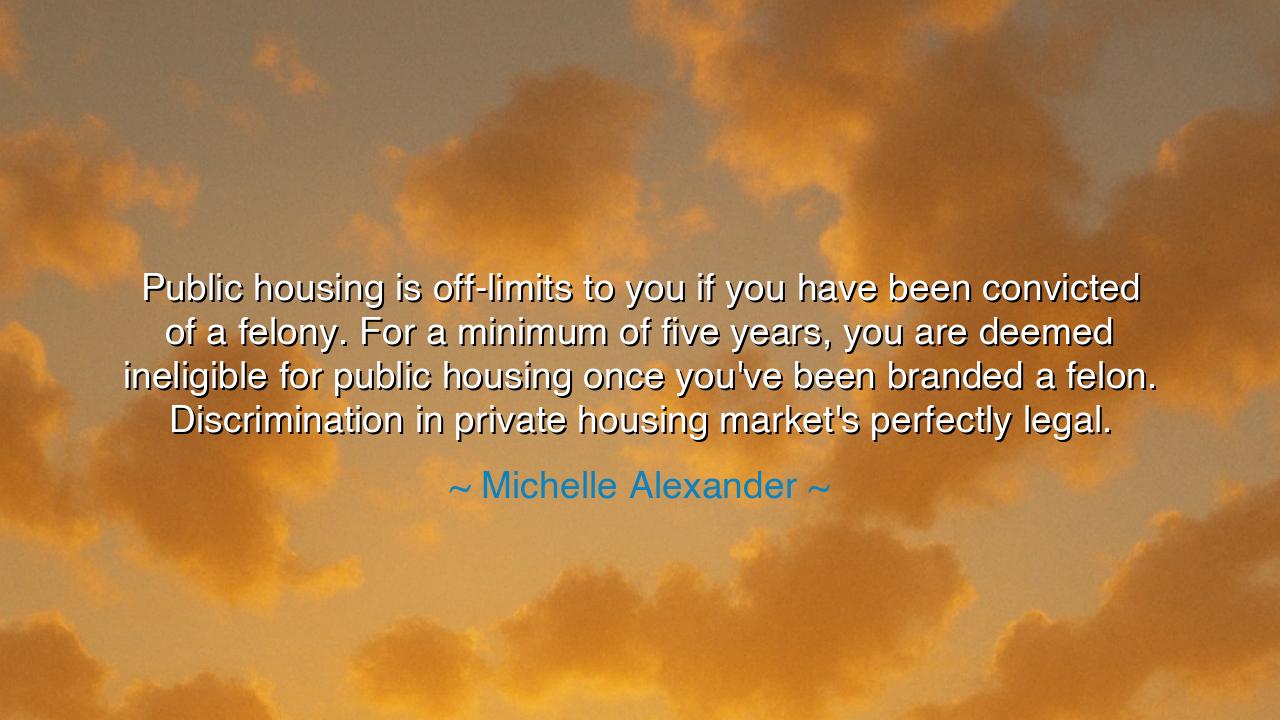
Public housing is off-limits to you if you have been convicted of
Public housing is off-limits to you if you have been convicted of a felony. For a minimum of five years, you are deemed ineligible for public housing once you've been branded a felon. Discrimination in private housing market's perfectly legal.






“Public housing is off-limits to you if you have been convicted of a felony. For a minimum of five years, you are deemed ineligible for public housing once you've been branded a felon. Discrimination in private housing market's perfectly legal.” Thus spoke Michelle Alexander, a voice of truth in a nation that still wrestles with the ghosts of its own laws. Her words are not mere statistics — they are lamentations carved from the suffering of millions. She reveals how the ancient chains of discrimination have not vanished, but merely changed their form, hiding themselves in the quiet cruelty of policy. Her message is a cry from the heart of justice: that though the prison gates may open, the world beyond remains a cage.
In these words, Alexander exposes the silent continuation of punishment — that the mark of a felony is not erased when a man has served his sentence, but follows him like a brand upon his soul. The ancient societies knew of exile, the punishment that cast men beyond the walls of their cities. Yet today, exile is reborn in another guise: the denial of shelter, the refusal of home. To be barred from public housing is not merely to be denied comfort; it is to be denied belonging, to be stripped of the most fundamental symbol of stability — a place to rest, to rebuild, to begin again.
The origin of these laws lies in the long shadow of America’s war on drugs and the moral panic that accompanied it. As Alexander revealed in The New Jim Crow, the machinery of mass incarceration did not simply punish crime — it created a permanent underclass, one bound not by chains of iron but by policies that lock the doors of opportunity. When she says, “Discrimination in private housing markets is perfectly legal,” she unveils the hypocrisy of a system that proclaims equality under law yet permits exclusion in practice. The felon becomes the new untouchable — visible to all, welcome to none.
Consider the story of Matthew Charles, a man who served twenty-one years in prison, found redemption, and rebuilt his life through faith and service. When at last he was released, he sought a home — yet was denied public housing because of his record. Though he had changed, the law saw only the man he had been. He slept in borrowed rooms, a free man without a dwelling, a soul forgiven but not restored. His struggle is not his alone; it is the story of countless others whose debt to society never seems paid in full.
Alexander’s words call forth the ancient truth that justice without mercy becomes tyranny, and that law, when wielded without compassion, ceases to serve the people. A nation that refuses to shelter its own citizens, even after they have borne the weight of punishment, sins not only against them but against its own moral foundation. For what civilization can call itself just if it denies a roof to the repentant, if it casts out those who seek to begin anew? Even the ancients, in their wisdom, allowed sanctuary to the fallen. Yet in our modern age, we build not sanctuaries, but bureaucratic walls.
There is also in this saying a reminder of how legality can disguise injustice. The system that bars the ex-offender from housing does not call itself cruel; it calls itself “policy.” The landlords who turn away applicants do not call themselves bigots; they say they are obeying the law. Thus, cruelty hides behind the mask of procedure, and discrimination becomes respectable. Alexander, with clarity and fire, tears away this mask, revealing that what is “legal” may still be immoral, and what is “normal” may still be inhumane.
The lesson, then, is clear and grave: a society must judge itself not by how it punishes, but by how it forgives. To reform the heart of justice, we must do more than unlock the prison door; we must open the gates of opportunity. The man or woman who has stumbled must not be condemned to wander without home or hope. The call is not merely for charity, but for transformation — to see the humanity in those once cast aside, to restore them as brothers and sisters, fellow builders of the common good.
So, O listener, remember the teaching of Michelle Alexander: laws alone cannot heal a nation’s soul. If the law closes doors to the fallen, let compassion open them. If policy denies a home, let conscience demand one. For no civilization endures by exile and exclusion. A people endure only when they choose redemption over rejection, mercy over fear. Build not more walls — build bridges, and homes, and hearts strong enough to welcome the returning traveler. Only then shall justice cease to be a weapon, and become what it was always meant to be — the guardian of human dignity.






AAdministratorAdministrator
Welcome, honored guests. Please leave a comment, we will respond soon